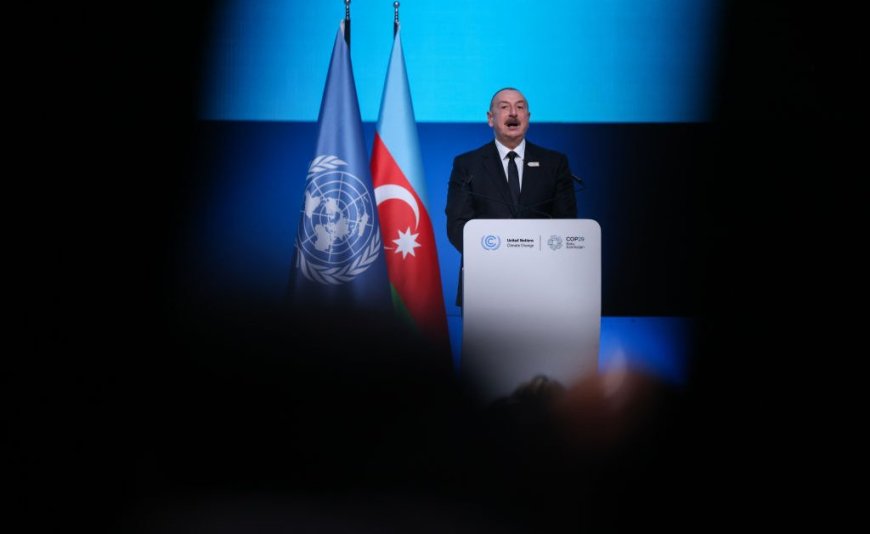Azerbaijan Should Never Have Been COP Host
The petrostate has an especially dubious human rights and climate record.


Today marks the second and final week of COP29—the annual U.N. climate change summit, which seeks solutions to the world’s top existential problem. The host? An oil-rich country that, according to the CIA World Factbook, is home to the Absheron peninsula in the Caspian Sea that local scientists say is “the ecologically most devastated area in the world.” [time-brightcove not-tgx=”true”]
Being a petro-state is not a crime. But how Azerbaijan’s fossil fuel wealth exacerbates the human condition at home and abroad makes its hosting of COP29 an Orwellian tragedy. While 95% of Azerbaijan’s exports are oil and gas, according to the environmental justice NGO Crude Accountability, the vast majority of the population is not benefiting from this wealth. Crude Accountability’s 2020 report “The Empty Bucket of the State Oil Fund of Azerbaijan” documents how quality of life is decreasing and, according to the World Bank, a quarter of the population is stuck in poverty.
The country’s authoritarian President Ilham Aliyev personally oversees the largest cash cow: the State Oil Fund. That may be why he considers Azerbaijan’s vast reserve of fossil fuels “a gift from God” even as it fails to uplift his people.
How did Azerbaijan ever become the COP29 host? The key to its success may well be how it has courted some of the world’s elites in ways that have put Azerbaijan in the spotlight in recent years. This long-term charm offensive, which serves to deflect criticism of Aliyev’s government and rebrand Azerbaijan as a vibrant destination, includes flying in celebrities and hosting international events like Formula 1. The practice is certainly not limited to Azerbaijan. Scholars affiliated with the National Endowment for Democracy have coined the term “sharp power” to describe affluent authoritarians’ attempts at quickly building global influence to cement their domestic rule. These days, few seem “sharper” than Azerbaijan.
The country’s poor environmental and human rights record stands out. Between the President and his late father Heydar, the Aliyevs have run Azerbaijan for more than five decades. Critics are routinely put under house arrest, jailed, exiled, and perhaps worse. Among the regime’s targets is Gubad Ibadoghlu, the lead author of Crude Accountability’s 2020 report, who was arrested in July 2023 while visiting family in Azerbaijan.
The country also recently launched a pandemic-era war of choice in 2020 in the disputed enclave of Nagorno-Karabakh, which ultimately pushed out the indigenous Armenian population within four years—in violation of International Court of Justice orders. The violent takeover followed a nine-month siege sugar-coated as an environmental protest. Azerbaijan then proudly declared Karabakh as the first region in Azerbaijan to become “net zero.” In March 2024, President Aliyev celebrated the predictable and preventable forced displacement with a traditional spring equinox bonfire, calling it a “final cleaning.”
Given Azerbaijan’s use of environmentalism to justify what leading human rights groups consider ethnic cleansing in Nagorno-Karabakh, COP29 for the regime is the final rubber stamp for its autocratic and hostile tendencies, including ongoing threats of invasion against Armenia.
Yet there is grassroots pushback around the world, including from international organizations like Freedom House, Human Rights Watch, and Amnesty International, as well as climate justice activists like Greta Thunberg—who is boycotting Azerbaijan for “being a repressive, occupying state, which has committed ethnic cleansing” and for using COP29 “to greenwash their crimes”—and Azerbaijani activists. Local activists in particular are bravely speaking out despite the enormous risks at home and abroad.
Resisting dictatorships is daunting. Just ask my friend Bahruz Samadov—a brave and brilliant young academic—who shouted, “Give me a voice at COP29!” during a recent jail transfer. He is among hundreds of political prisoners in Azerbaijan, in addition to two dozen Armenian prisoners of war, including senior Karabakh leaders, who face decades behind bars. Samadov is charged with “high treason” for criticizing Azerbaijan’s policy on Nagorno-Karabakh and for his ties to Armenian activists.
Plenty of people have argued that a petro-aggressor should have never hosted COP29—but what’s done is done. The issue now is whether various heads of states and representatives from more than 180 countries at the U.N. climate conference will have the courage to speak up for the rights of Azerbaijani political prisoners and Armenian hostages, including by requesting to meet with them, and push for the safe return of the ethnically-cleansed Armenian population of Nagorno-Karabakh.
Doing what’s right in Azerbaijan is hardly a regional matter. Just like Azerbaijan’s 2020 war on Nagorno-Karabakh without global repercussions arguably encouraged other autocrats like Vladimir Putin to follow suit, whatever happens in Baku this week may not stay in Baku. A petro-aggressor hosting COP29 is hardly hot air.


























































